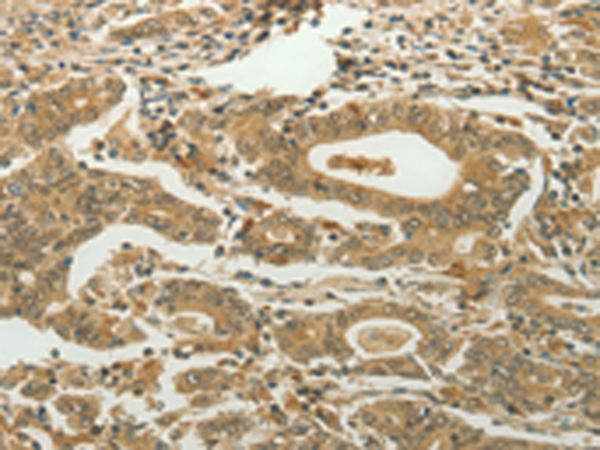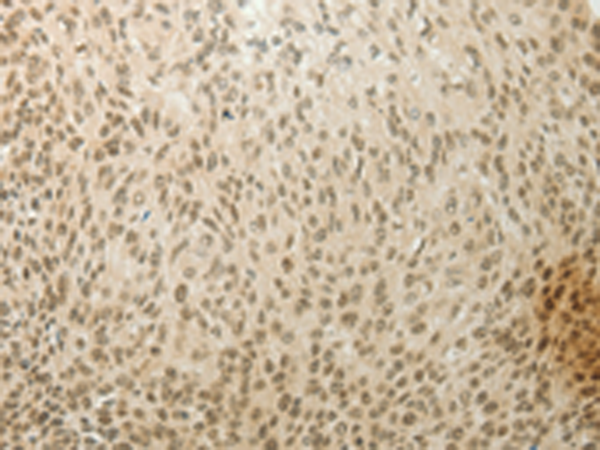


| WB | 咨询技术 | Human,Mouse,Rat |
| IF | 咨询技术 | Human,Mouse,Rat |
| IHC | 1/50-1/200 | Human,Mouse,Rat |
| ICC | 技术咨询 | Human,Mouse,Rat |
| FCM | 咨询技术 | Human,Mouse,Rat |
| Elisa | 1/2000-1/10000 | Human,Mouse,Rat |
| Aliases | 2ADUB, 2A-DUB, RP4-592A1.1 |
| WB Predicted band size | 95 kDa |
| Host/Isotype | Rabbit IgG |
| Antibody Type | Primary antibody |
| Storage | Store at 4°C short term. Aliquot and store at -20°C long term. Avoid freeze/thaw cycles. |
| Species Reactivity | Human, Mouse |
| Immunogen | Synthetic peptide of human MYSM1 |
| Formulation | Purified antibody in PBS with 0.05% sodium azide and 50% glycerol. |
+ +
以下是关于MYSM1抗体的3篇代表性文献的简要信息:
1. **文献名称**:MYSM1 is essential for human hematopoiesis and lymphocyte differentiation
**作者**:Le Guen T, et al.
**摘要**:研究利用MYSM1特异性抗体揭示其在造血干细胞分化和淋巴细胞发育中的关键作用,发现MYSM1缺失导致DNA修复缺陷和免疫细胞发育异常。
2. **文献名称**:The histone H2A deubiquitinase MYSM1 regulates chromatin homeostasis in human cancer
**作者**:Zhu P, et al.
**摘要**:通过MYSM1抗体染色质免疫沉淀(ChIP)实验,发现MYSM1通过调控组蛋白H2A去泛素化抑制肿瘤发生,其缺失导致基因组不稳定性和癌基因激活。
3. **文献名称**:MYSM1 modulates innate immunity by regulating IRAK4 signaling activation
**作者**:Nijnik A, et al.
**摘要**:研究使用MYSM1抗体进行Western blot和免疫共沉淀,证明MYSM1通过抑制IRAK4通路负调控TLR信号,从而限制过度炎症反应。
**备注**:若需更详细文献信息或实验方法细节,可进一步提供PMID或DOI编号。
MYSM1 (Myb-like, SWIRM, and MPN domains-containing protein 1) is a histone 2A deubiquitinase that plays a critical role in epigenetic regulation, DNA damage repair, and immune system modulation. It functions by removing ubiquitin moieties from histone H2A at lysine 119 (H2AK119ub), a post-translational modification associated with transcriptional repression. MYSM1 is essential for hematopoietic stem cell maintenance, lymphocyte development, and inflammatory response regulation. Dysregulation of MYSM1 has been implicated in immune disorders, bone marrow failure syndromes, and certain cancers.
MYSM1 antibodies are immunological tools designed to detect and quantify MYSM1 protein expression in research applications. These antibodies are typically developed using immunogenic peptides or recombinant protein fragments of MYSM1. often raised in hosts like rabbits or mice. They are widely used in techniques such as Western blotting, immunoprecipitation, immunofluorescence, and chromatin immunoprecipitation (ChIP) to study MYSM1's localization, interactions, and functional roles. Validated MYSM1 antibodies help elucidate its involvement in chromatin remodeling, gene expression control, and cellular responses to DNA damage.
Research utilizing MYSM1 antibodies has revealed its dual role in both activating and repressing transcription, depending on cellular context. Its deficiency is linked to impaired B-cell differentiation and immune dysregulation. Commercially available MYSM1 antibodies are often characterized for specificity using knockout cell lines or tissues. These reagents are pivotal for advancing studies in immunology, cancer biology, and regenerative medicine, offering insights into MYSM1's therapeutic potential as a target for inflammatory diseases or malignancies.
×